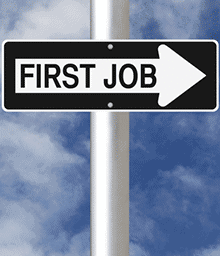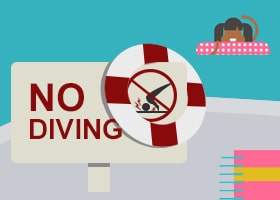 As exciting as any new job may be, you need to be aware that there is always a chance that the new position you land may not be quite the right fit. It’s not just something that occurs in health care, this happens at some point in most peoples’ professional lives. The job might not be what you expected, or in reality could turn out to be different to how it was described during the interview process. Here are a few tips to help you if you find yourself in this position early in your new career. Take your time If you’re not sure the position is right for you, don’t run out the door immediately because of an initial ‘bad vibe’. Give yourself a good three months to settle in and cool off. No matter how good a student you were, starting a new job can be incredibly overwhelming. The learning curve can be so steep that it’s almost a vertical straight line. While you’re at the bottom of that ‘ learning curve’, you’re not in the best place to make an informed decision about the job or your future. Adopt a different mental approach As tough as it might be to admit, it may be you that’s the problem. If you go into a new job hesitantly, you might not be giving the position a chance. Adopt a different attitude, remember why you entered the career in the first place, and you might just see the glass is half-full rather than half-empty. Talk about it Don’t be frightened to voice your concerns – just don’t do it on the first day, or even during those first few weeks, and don’t complain to colleagues and work friends. Once you’ve weathered the initial storm, if you still have concerns talk to your supervisor or to HR. If you’ve performed well and are proving to be an asset, they might not be aware of your feelings, and therefore will be unable to help. Don’t think of yourself as a failure When you find yourself in a place where you’re starting to second-guess your decision, you’ll go through many emotions. The first of which is disappointment. But if you do find yourself in this situation, don’t be too down-hearted because second-guessing a new position is not unusual. According to the Global Selection Forecast 2012 report, only half of the 2000 new hires surveyed said they were ‘very confident’ in their decision to accept their new jobs. Leave with dignity If you’ve given the job some time, and something’s still not right, then start looking. Most recruiters will tell you that it’s always easier to find a job when you’ve got a job. If you’re looking for a reference, and don’t want to have to leave a gap in your resume, make sure that you leave with dignity. If you give notice and your employer wants you to work it, work hard and put in your best effort to the very end. Think about the impact on your resume Taking a sensible approach to this situation will be more beneficial to your long-term career plans than making an impulsive decision to leave. Most recruiters know and accept that sometimes a job just isn’t the right fit. But if your resume is littered with short-term positions lasting a few months here or a couple of weeks there, then recruiters might think you have a bigger problem. Talk to your campus Career Services department about all aspects of your job search. Ask for advice on the right questions to ask during the interview process; questions that could help you minimize the chances of finding yourself in this position.
As exciting as any new job may be, you need to be aware that there is always a chance that the new position you land may not be quite the right fit. It’s not just something that occurs in health care, this happens at some point in most peoples’ professional lives. The job might not be what you expected, or in reality could turn out to be different to how it was described during the interview process. Here are a few tips to help you if you find yourself in this position early in your new career. Take your time If you’re not sure the position is right for you, don’t run out the door immediately because of an initial ‘bad vibe’. Give yourself a good three months to settle in and cool off. No matter how good a student you were, starting a new job can be incredibly overwhelming. The learning curve can be so steep that it’s almost a vertical straight line. While you’re at the bottom of that ‘ learning curve’, you’re not in the best place to make an informed decision about the job or your future. Adopt a different mental approach As tough as it might be to admit, it may be you that’s the problem. If you go into a new job hesitantly, you might not be giving the position a chance. Adopt a different attitude, remember why you entered the career in the first place, and you might just see the glass is half-full rather than half-empty. Talk about it Don’t be frightened to voice your concerns – just don’t do it on the first day, or even during those first few weeks, and don’t complain to colleagues and work friends. Once you’ve weathered the initial storm, if you still have concerns talk to your supervisor or to HR. If you’ve performed well and are proving to be an asset, they might not be aware of your feelings, and therefore will be unable to help. Don’t think of yourself as a failure When you find yourself in a place where you’re starting to second-guess your decision, you’ll go through many emotions. The first of which is disappointment. But if you do find yourself in this situation, don’t be too down-hearted because second-guessing a new position is not unusual. According to the Global Selection Forecast 2012 report, only half of the 2000 new hires surveyed said they were ‘very confident’ in their decision to accept their new jobs. Leave with dignity If you’ve given the job some time, and something’s still not right, then start looking. Most recruiters will tell you that it’s always easier to find a job when you’ve got a job. If you’re looking for a reference, and don’t want to have to leave a gap in your resume, make sure that you leave with dignity. If you give notice and your employer wants you to work it, work hard and put in your best effort to the very end. Think about the impact on your resume Taking a sensible approach to this situation will be more beneficial to your long-term career plans than making an impulsive decision to leave. Most recruiters know and accept that sometimes a job just isn’t the right fit. But if your resume is littered with short-term positions lasting a few months here or a couple of weeks there, then recruiters might think you have a bigger problem. Talk to your campus Career Services department about all aspects of your job search. Ask for advice on the right questions to ask during the interview process; questions that could help you minimize the chances of finding yourself in this position.



